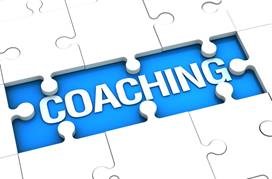LEADERSHIP COACHING
 Football legend Vince Lombardi said that, “leaders are made, not born.” When it comes to effective leadership, we can all use a strategy that helps us hone our skills and bring out the best in our team. But figuring out how to do that can be a challenge and can feel overwhelming when you already have a lot of other responsibilities on your plate. We often get so caught up in thinking that our current leadership methods are working “well enough,” so why rock the boat? Leadership coaching is an ideal way to break out of a leadership rut and get a fresh perspective.
Football legend Vince Lombardi said that, “leaders are made, not born.” When it comes to effective leadership, we can all use a strategy that helps us hone our skills and bring out the best in our team. But figuring out how to do that can be a challenge and can feel overwhelming when you already have a lot of other responsibilities on your plate. We often get so caught up in thinking that our current leadership methods are working “well enough,” so why rock the boat? Leadership coaching is an ideal way to break out of a leadership rut and get a fresh perspective.
What does leadership coaching entail? It’s a chance to step back from your everyday method of leadership, examine what’s working and address what’s not. Initially, we take a look at your leadership style and behaviors, along with those in your organization. We then meet to discuss issues and plans. Support and guidance is offered to address any concerns. A multi-step plan of action is developed, and helpful tools and resources are provided (i.e. – reading materials, technology tools, outside learning opportunities). And don’t forget accountability and feedback. We meet regularly to determine how things are going, where you are with your goals and how your skills are developing.
What are the benefits? First of all, you’ll become a more effective leader through greater self-awareness of your decisions, how to best use the strengths of your team and effective delegation of tasks. But it goes far beyond that. You’ll also gain confidence, discover strengths and talents you may not have known existed and gain a new perspective. Your organization will benefit through your enhanced skills and you’ll uncover new methods of tackling challenges while bringing out the best in your team.
Have you been struggling with the challenges of leadership? Or do you feel like your “tried and true” methods could use a little, well, tweaking? Then, let’s talk! Leah M Joppy and Associates has a wealth of experience helping leaders with all different levels of experience, from those new to the role to others who have been at it for years. Call us at 301-670-0051 or email leah@lmja.com to discuss your unique needs.
Check out our article on why people choose to work with a coach.
IMPLICIT BIAS (Part 1)
 You may have heard the term “implicit bias” used to describe different situations, but may not really know what it means. Implicit bias, also known as unconscious bias, refers to judging people based on our unconscious thoughts, beliefs or feelings. It often happens without us realizing it when our brains make quick assessments and judgments of people and situations.
You may have heard the term “implicit bias” used to describe different situations, but may not really know what it means. Implicit bias, also known as unconscious bias, refers to judging people based on our unconscious thoughts, beliefs or feelings. It often happens without us realizing it when our brains make quick assessments and judgments of people and situations.
Whether we want to admit it or not, everyone has biases. However, it’s important to remember that bias stereotypes do not often come from a place of bad intent. Rather, implicit biases are the product of learned associations and social conditioning. They start at a young age and are formed in our brains through years of various influences. Think about the following questions and how your implicit or unconscious bias may come into play:
- Picture a nurse at your local hospital. What’s the image that pops into your head?
- Picture a firefighter at your local firehouse. Again, what image comes to mind?
- You’ve just been cut off in traffic and are astonished that someone can drive that badly! What image enters your head when you think about the driver?
- A new stay-at-home parent wants to join your playgroup. Before the parent arrives, what image comes to mind?
- You’re boarding a plane and peek into the cockpit. The pilot, co-pilot and flight engineer are all women. What are your first thoughts?
These can be tough questions to answer honestly. We’d like to think that we’re past all the typical stereotypes that exist in our society. We can feel embarrassed or ashamed that we’re surprised if a stay-at-home parent is a father or a firefighter is a woman. Again, implicit biases don’t exist because we’re bad people, but are so deeply ingrained in our brains that we have to fight the automatic urge to jump to conclusions
Our biases affect us and our decision-making processes in so many different ways, including our perceptions, attitudes and behaviors. Next month, we’ll discuss how implicit bias can affect life in the workplace. Leah M Joppy and Associates regularly conducts seminars to address and combat unconscious bias. For more information and to discuss the unique needs of your organization, contact us at 301-670-0051 or email leah@lmja.com.
Coaching For High Level Administrative Staff
 If you’re in a high-level administrative position, you’re used to wearing a lot of hats. From handling a wide variety of day-to-day duties to dealing with all types of personalities, it’s a job that requires a lot of knowledge and flexibility. Plus, you’re expected to do it all with a smile on your face and a “can do” attitude. High-level administrative positions can be extremely demanding and can sometimes lead to high stress levels and burnout. Here are some of the common challenges people in these positions face:
If you’re in a high-level administrative position, you’re used to wearing a lot of hats. From handling a wide variety of day-to-day duties to dealing with all types of personalities, it’s a job that requires a lot of knowledge and flexibility. Plus, you’re expected to do it all with a smile on your face and a “can do” attitude. High-level administrative positions can be extremely demanding and can sometimes lead to high stress levels and burnout. Here are some of the common challenges people in these positions face:
Challenge 1: Maintaining a work/life balance
Challenge 2: Dealing with difficult people
Challenge 3: Ensuring proper communication strategies are in place and making sure they’re followed
Challenge 4: Feeling disrespected and blamed for anything that goes wrong
Challenge 5: Feeling like you need to be available 24/7
If you’re an executive assistant, maybe some of these challenges sound familiar to you. And maybe you’re ready to make some changes that will help you both in your job and outside the office. That’s where a life coach can work with you and provide valuable perspective. By assessing the unique challenges you face in your position, a life coach can help you develop a detailed action plan with clear and specific expectations. Some of the outcomes from working with a life coach include:
- Building a stronger partnership with your manager(s)
- Establishing stronger boundaries
- Improving communication and streamlining processes
- Increasing productivity and feeling more focused dealing with day-to-day tasks
- Reducing stress and enjoying your job (and life!) more
If you’re starting to feel the burnout that often accompanies high-level administrative positions and want to make some meaningful life changes, Leah M. Joppy and Associates is ready to help. Call us at 301-670-0051 or email us at leah@lmja.com.
Need more reasons for choosing to work with a coach? Learn more.
End Of Year Budget Needs – Popular Courses (Part 2)
 If your EOY budget still contains money that needs to be spent, you may be thinking about what to do with those extra dollars. Investing them in your team is something that will pay off for years to come! Last month, we focused on two of our most popular courses that have helped departments deal with conflict and develop effective interpersonal skills. Here’s a look at two more of our most sought-after courses that we’re focusing on this month:
If your EOY budget still contains money that needs to be spent, you may be thinking about what to do with those extra dollars. Investing them in your team is something that will pay off for years to come! Last month, we focused on two of our most popular courses that have helped departments deal with conflict and develop effective interpersonal skills. Here’s a look at two more of our most sought-after courses that we’re focusing on this month:
Developing Inclusive Teams: According to studies on the subject, leaders who create an inclusive culture for their team see performance increase by 17 percent, as well as increases in collaboration and decision-making quality. While most managers believe having a diverse and inclusive work culture is critical to performance, they don’t always know how to achieve that goal. Our course covers a broad range of topics, such as examining the culture of an organization, identifying current and potential problems and providing tangible tools for meaningful change. Each organization faces it’s own unique challenges when it comes to inclusivity and we work with you to build a customized course that will yield real results.
Organizational Strategic Planning: Organizational strategic planning is an incredibly important activity that covers a lot of bases. It involves setting priorities, determining where to focus energy and resources, ensuring that employees are working towards common goals and so much more. Our course helps you develop an effective strategic plan that clearly lays out where your organization is going, the actions needed to make progress and a blueprint for success.
If you have money left in your EOY budget to spend and are ready to invest it in your most important asset (your team!), Leah M. Joppy and Associates is ready to help! Call us at 301-670-0051 or email us at leah@lmja.com.
Coaching For Any Level
 Whether you’re starting out in your career or have spent years climbing the ladder, working with a coach provides an opportunity to achieve both short-term and long-term goals, as well as improvement in other areas. Wherever you stand in your job right now, chances are you’re wondering what the future holds in the next year or five years and beyond. Let’s start with a few questions that everyone should ask himself or herself, from entry level to executive:
Whether you’re starting out in your career or have spent years climbing the ladder, working with a coach provides an opportunity to achieve both short-term and long-term goals, as well as improvement in other areas. Wherever you stand in your job right now, chances are you’re wondering what the future holds in the next year or five years and beyond. Let’s start with a few questions that everyone should ask himself or herself, from entry level to executive:
- How do you feel about your career? Do you like going to work?
- Do you feel you’ve reached your full potential or do you feel like there’s something better for you out there?
- Is your career in alignment with your values?
- What areas do you feel could use improvement? Are there skill areas you’d like to learn and/or develop?
Maybe you feel like you’re too busy and just trying to deal with the day-to-day to really answer these questions. That’s where coaching can help. Here’s how:
Coaching for Entry Level Employees: You had such optimism and excitement starting out, but maybe that enthusiasm is starting to wane a bit. Your confidence might be a little tattered and you’re wondering if there’s potential in your career (or if you’ve even chosen the right field in the first place). Working with a coach provides guidance and accountability, as well as tools and strategies to help you build a fulfilling career that actually makes you excited to go to work!
Coaching for Middle Management: You’ve been working for a while and you’ve reached a management position. Now what? This is often the time where you can feel “stuck” and wondering if you’ve made the right career decision. You’ve invested a fair number of years in your present career, so would it make sense to make changes now? And what does the future hold? Is there potential for more and how can it be achieved? Coaching really delves into these areas and provides clarity and accountability for your future.
Coaching for Executives: Perhaps you’re thinking, “an executive has reached the pinnacle of his/her career. Why would coaching even be needed at this level?” Executives face a number of challenges that make coaching an effective and necessary component to unlock leadership potential. It not only maximizes an executive’s skill set, but it also develops a stronger team. Leadership is a skill that must be honed and working with a coach can help executives build a work environment that emphasizes employee trust and loyalty. And that’s just the beginning. There’s also building emotional intelligence, learning impactful communication and establishing a work/home balance, just to name a few.
Whether you’re just getting started or have been at it for years, working with a coach can benefit you at any level. Leah M. Joppy and Associates is ready to help you at any stage of your career. Call us at 301-670-0051 or email us at leah@lmja.com and let’s get started.
End Of Year Budget Needs – Popular Courses
 If you’re examining your EOY budget and have last minute money that needs to be spent, now is an ideal time to invest those dollars in your team. Think about both the victories and challenges that you’ve experienced so far this year. Is there a conflict that might have been resolved better? Are there areas that need improvement, like enhanced communication or trust? This month and next, we’re focusing on our most popular courses that have changed the way offices operate, communicate and deal with issues. They’re a great investment in the most important part of your department – your people:
If you’re examining your EOY budget and have last minute money that needs to be spent, now is an ideal time to invest those dollars in your team. Think about both the victories and challenges that you’ve experienced so far this year. Is there a conflict that might have been resolved better? Are there areas that need improvement, like enhanced communication or trust? This month and next, we’re focusing on our most popular courses that have changed the way offices operate, communicate and deal with issues. They’re a great investment in the most important part of your department – your people:
Here are two of our most sought-after courses that we’re focusing on this month:
Effective Interpersonal Skills: Interpersonal skills are sometimes referred to as people skills, soft skills or emotional intelligence skills. In a nutshell, they’re the way you communicate and interact with others. Valuable interpersonal skills include: teamwork, leadership, empathy, active listening and so much more. In this course, we delve into verbal and non-verbal cues, why they matter and how to build strong interpersonal skills that will enhance the harmony and productivity of your office.
Conflict Management Skills: Problems can arise on any team. Whether you’re a manager or employee, you will likely need to resolve conflict at some point in your job. This might involve solving an issue between staff members, yourself and a colleague or with someone outside your department. Our course helps you develop conflict resolution skills, deal with constructive criticism and gain important counseling, mediating and problem-solving skills.
If you have money left in your EOY budget to spend and are ready to invest it in your most important asset (your team!), Leah M. Joppy and Associates is ready to help! Call us at 301-670-0051 or email us at leah@lmja.com.
Why Everyone Needs a Life Coach
 The concept of life coaching is becoming more and more popular every year. You may even know someone who has worked with a life coach and find the idea intriguing. But what exactly does a life coach do and how can one help you with your own unique set of challenges? A life coach is someone who counsels clients on anything from career obstacles to personal struggles. A coach plays multiple roles in your life: he/she unlocks your potential, allows you to discover your best self, acts as a motivator and is an accountability partner.
The concept of life coaching is becoming more and more popular every year. You may even know someone who has worked with a life coach and find the idea intriguing. But what exactly does a life coach do and how can one help you with your own unique set of challenges? A life coach is someone who counsels clients on anything from career obstacles to personal struggles. A coach plays multiple roles in your life: he/she unlocks your potential, allows you to discover your best self, acts as a motivator and is an accountability partner.
If you’ve been doing some soul searching and feel like you could use a little help (or even if things are going great!), here are just a few reasons why working with a life coach could put you on the path to real and meaningful change:
- You’re feeling “stuck”: Our lives are always in transition. At times, we may feel like nothing is working in our favor and we’re not moving forward. A life coach helps you realize what you truly want from life and helps you overlook all the noise in your head that’s keeping you from achieving your goals.
- You’re feeling lost: Maybe you don’t know what you want. Perhaps you feel like you’re living your life on auto-pilot. A life coach will help you identify your personal values and how those values can translate into a more meaningful career, personal life, etc.
- You’re feeling unhappy: You know you need a change. Or you know you need to change. Either way, a life coach can help you pinpoint why you’re unhappy and help you take steps to enact meaningful and long-lasting solutions.
- You’re feeling happy: I know, I know. If you’re already happy, why do you need a life coach? Happiness can be a great motivator for change. If you love where you are in life, you’re more likely to be open to growth and wonder what else is out there to reach out and grab!
- You’re feeling comfortable: Ah, there’s nothing like your routine and comfort zone! Any variation of the familiar and you break out in a sweat. A life coach partners with you to push you out of your routine and explore what else is out there.
- You’re feeling scared: Who isn’t? You’re scared of failure, success, what people will think and say, etc. etc. A life coach will help you figure out your fears, provide you with tools to take action despite those fear and change the way you look and feel about them.
Life coaches aren’t a magic pill for all of life’s ups and downs. The solutions always reside inside of you. However, many times we’re so full of doubt and fear that we can’t hear or see the answers in front of us. Coaching helps you look at any situation from a different perspective to help you break through paralyzing thoughts.
Interested in learning more about life coaching and how working with one can bring positive and meaningful change to your life? Call Leah M. Joppy and Associates at 301-670-0051 or email us at leah@lmja.com and let’s get started. And check out our article on why people hire a coach.
Q&A For Your Life Coach
 You’re ready to make some changes and you’ve decided that it’s time to work with a life coach. But now what? It can be tough to know what you should be looking for in a coach, especially if you’ve never worked with one. How do you make sure your coach will be the right fit for you and has the right background to address your unique needs? Here are a few questions to ask a potential coach to see if he/she is the best match:
You’re ready to make some changes and you’ve decided that it’s time to work with a life coach. But now what? It can be tough to know what you should be looking for in a coach, especially if you’ve never worked with one. How do you make sure your coach will be the right fit for you and has the right background to address your unique needs? Here are a few questions to ask a potential coach to see if he/she is the best match:
Question 1: Why did you become a coach?
Question 2: What is your background and work experience?
Question 3: What is your coaching experience? How about training and certification?
Question 4: What is your coaching specialty? Are there areas in which you primarily work?
Question 5: What is your approach or philosophy about coaching?
Question 6: What methodologies and tools do you use?
Question 7: What are some of your coaching success stories?
After you’ve consulted with a potential coach, evaluate what the experience was like interacting with them. Were they easy to get a hold of? Did they follow up with you in a timely manner after you reached out? Did they answer your questions thoughtfully and thoroughly? Typically the way someone acts during your initial exchange is a good indication of the way they will act if you’re working together.
A life coach is an important ally to help you achieve your goals, make big decisions and stay accountable for the things you want to achieve in life. If you’re ready to work with a life coach, Leah M. Joppy and Associates is ready to help! Call us at 301-670-0051 or email us at leah@lmja.com and let’s work together to make your goals a reality.
For reasons why someone would hire a coach, check out our article.
Why Is It So Hard to Keep Our Goals?
 You start out motivated, enthusiastic, and with the best intentions. You’ve identified a goal (or two) and this time it’s going to be different. This time, you’re REALLY going to put in the work, see it through, and accomplish your goal once and for all. And then “things” start to get in the way, like time, finances, and life. All those good intentions are replaced with excuses and, before you know it, that goal you set out to achieve with such gusto seems impossible to accomplish.
You start out motivated, enthusiastic, and with the best intentions. You’ve identified a goal (or two) and this time it’s going to be different. This time, you’re REALLY going to put in the work, see it through, and accomplish your goal once and for all. And then “things” start to get in the way, like time, finances, and life. All those good intentions are replaced with excuses and, before you know it, that goal you set out to achieve with such gusto seems impossible to accomplish.
No matter what goal you’re trying to reach – career, financial, health, or relationship – there are some common reasons why you’re throwing in the towel and accomplishing it. Several of them are listed below:
- Waiting to take action until you feel “ready.” If you’re waiting for the stars to be aligned and everything to be perfect, you may be waiting a long time.
- Putting your goals off until “someday.” So many of us “someday” ourselves right out of what we want to accomplish in life.
- Not making your goal a priority. Saying you want to make a change is one thing. Putting in the work to make it happen is quite another.
- Viewing mistakes as failure. People often think that a step backwards means it’s time to put on the breaks. But progress rarely comes in a straight line.
- Giving up before you see results. Results don’t always fall in line within the timeframe you imagined. Impatience can be big hurdle to change.
- Neglecting to anticipate the tough times and hurdles. Change isn’t easy and some days are harder than others. This can be a challenging lesson to learn.
- Falling victim to the “fear of success.” Yes, this is really a thing. Some people don’t always feel that they deserve or are worthy of success and can sabotage their progress.
When these fears and thoughts come up, a lot of people immediately see them as a stop sign and think it’s time to call it quits. But this time it can be different. By identifying the various roadblocks, you can view them as part of the process. You can face them, process them, and even welcome them. Best of all, you can overcome them and make 2019 the year you finally accomplish your goal(s). Leah M. Joppy and Associates can help. Call us at 301-670-0051 or email us at leah@lmja.com to discuss your needs.
Overcoming Obstacles To Your Goals
 Thomas Edison said, “Many of life’s failures are people who did not realize how close they were to success when they gave up.” As we discussed in the previous article, there are so many reasons why people abandon their goals. What can we do to overcome some of these obstacles and start moving towards accomplishing our goals? Here are a few ideas:
Thomas Edison said, “Many of life’s failures are people who did not realize how close they were to success when they gave up.” As we discussed in the previous article, there are so many reasons why people abandon their goals. What can we do to overcome some of these obstacles and start moving towards accomplishing our goals? Here are a few ideas:
Acknowledge Fear: There’s an acronym for FEAR: False Evidence Appearing Real. We’ve all experienced fear, but the key is to acknowledge where you fears lie and what fears are true and what aren’t based in reality. Ask yourself, “what’s the worst that could happen?” And then, “what’s the best that could happen?” Almost always, the good outweighs the bad.
Quiet those Nagging Thoughts: You know the ones: “I don’t have time to work towards my goals.” “I’m already maxed out!” “I’m not good enough to achieve [insert goal here].” Bring them to the surface and acknowledge them. They’ve been there all along and they’re holding you back. By becoming conscious of those nagging voices in your head, you can face each thought and develop a plan to move past them.
Just start: Maybe it’s 5 minutes a day and you set a timer. Put aside the “someday I’ll do it” and “when I’m ready” and just accomplish one task. However small it may seem, the act of doing SOMETHING can build confidence and start to put a goal-achieving plan into action.
There are so many things that can stop us from making our goals a reality. But with the right tools and mindset in place, we can calm the voices in our head saying we can’t do it and move towards meaningful change. Leah M. Joppy and Associates is ready to help! Call us at 301-670-0051 or email us at leah@lmja.com and let’s work together to make your goals a reality.